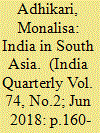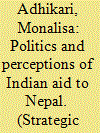|
|
|
Sort Order |
|
|
|
Items / Page
|
|
|
|
|
|
|
| Srl | Item |
| 1 |
ID:
171967


|
|
|
|
|
| Summary/Abstract |
Since the 1990s, the face of United Nations (UN) peacekeeping has changed drastically, with personnel contributions now coming predominantly from developing countries. Some of the most fragile states worldwide, marked by limited state capacity and domestic conflict, have been deploying their security forces in UN peacekeeping missions. Drawing on the literature on civil–military relations, this article examines the impact that such deployments have on the domestic politics of troop contributing countries (TCCs). Using a detailed case study of Nepal’s deployment of peacekeepers, this article makes the following argument: the UN has not prioritized making peacekeeping deployments conditional on respect for civilian supremacy by the security forces of TCCs. Yet, deploying peacekeepers may bring significant institutional, political and financial benefits to security forces, most notably the military, which directly and indirectly impacts the civil–military relations in TCCs.
|
|
|
|
|
|
|
|
|
|
|
|
|
|
|
|
| 2 |
ID:
160015


|
|
|
|
|
| Summary/Abstract |
In fragile and conflict-affected States1 (henceforth FCAS) in South Asia, two distinct forms of international engagement have worked simultaneously—the engagement of India, the regional hegemon, and that of Western states that promote liberal peacebuilding projects. From Norwegian engagement in Sri Lanka to European Union (EU) and United Nations (UN) engagement in Myanmar, to the UN-led international engagement in Nepal, liberal peacebuilding, despite its fault lines, has ubiquitous presence in South Asia, a region fraught with different forms of conflict and fragility. The norms, practices and modalities of engagement of India as well as of liberal peacebuilding projects have their distinct specificities in their normative foundations, practices and modalities of engagement. This article contends that the current interaction, though often unacknowledged, is marked by uncertainties, contrasts, instrumental use of norms, lack of coordination and even unexpected overlaps. This article primarily argues that in order for India to play a constructive role in the region, it needs to devise a policy on how it engages with liberal peacebuilding norms and its diffusion in practice through a variety of organisational and institutional networks.
|
|
|
|
|
|
|
|
|
|
|
|
|
|
|
|
| 3 |
ID:
130724


|
|
|
|
|
| Publication |
2014.
|
| Summary/Abstract |
India has significantly invested in Nepal's development through economic assistance since 1952. Despite deploying aid to win the hearts and minds of the people of Nepal, India has not entirely succeeded in doing so. Paradoxically, an analysis of Indian aid and gaps in the planning, processes, modalities and perceptions of India's motivation shows that it has possibly contributed to the fuelling of anti-India sentiments among the Nepalese population. Although Indian aid has not been refused, it has been resisted, and sceptical nationalist sentiments dominate perceptions of Indian aid in Nepal. Why is India not perceived as a major donor despite providing significant aid? Why do vested political and economic interests mar the public perception of Indian aid to Nepal? This article is an attempt to reconstruct the history of India's developmental aid to Nepal, outline the trends, shifting priorities and modalities as well offering a critical analysis of the perceptions of Indian aid. The article is limited to development aid and excludes military aid and investments.
|
|
|
|
|
|
|
|
|
|
|
|
|
|
|
|
|
|
|
|
|